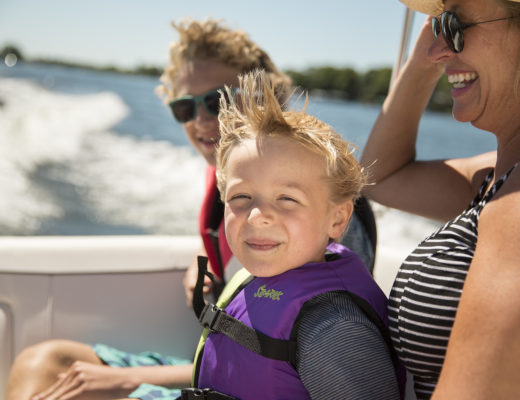Who requires a Boater Education ID Card in Delaware?
In Delaware, all boat operators born on or after January 1st, 1978 are required to complete a boating safety course. The course must be approved by the Delaware Division of Fish and Wildlife. Boaters are required to carry the resulting certificate of boating safety education at all times when operating a boat. Any person with a valid Delaware River Captain’s, Bay pilot’s license or the equivalent is exempt.
Persons must be at least 14 years of age to operate a personal watercraft. An adult must be o board when a 14 or 15 year old who has completed a boating safety course and holds a certification card is operating. PWC operators 16 years of age, who hold a boating safety education certificate, can operate without adult supervision.
Delaware Life Jacket Requirements
Boaters in Delaware are required to have at least one U.S. Coast Guard approved wearable (Type I, II or III) PFD or lifejacket for each person on board. In addition, you must also have at least one U.S. Coast Guard approved Type IV PFD, either a ring buoy or seat cushion, if the vessel is 16 feet in length or greater.
Exceptions to this requirement include:
- Personal Watercraft;
- Canoes and Kayaks; and
- Inflatable rafts.
Delaware law also requires the following:
- Anyone being towed behind a vessel is considered on board and must wear a PFD.
- All PWC occupants must be wearing a PFD while underway.
All boaters or passengers 12 years of age and younger must wear an approved Type I, II, III or V PFD at all times while the vessel is underway. The exception to this rule is when the child is below deck or in an enclosed cabin, or when the vessel is at anchor or moored.
Boat Registration Requirements in Delaware
In order to legally operate a boat in Delaware, you must obtain a Certificate of Number (registration card) and validation decals. The Certificate of Number must be on board and be available for inspection by an enforcement officer during boat operation.
Exemptions:
- Non-motorized boats.
- Boats documented by the Coast Guard.
- Boats that have been registered in another state or country and are using Delaware’s waters for 60 days or less.
The Certificate of Number and validation decals are obtained by submitting an application and fee to any authorized licensing agent. Boat registrations are valid for 1-3 years (at the owner’s choice)
Registration Number and Decal Placement
- The numbers must be applied as a decal, painted or permanently affixed to each side of the boat’s bow (boat owners are not permitted to display any other numbers in this area).
- Number must be in bold block letters that are at least 3 inches high and in a color that contrasts with the color of the boat.
- The numbers must be separated from the letters by a hyphen or by an equivalent space.
- The number must be read from left to right.
- Validation decals must be:
-
-
- Affixed on both sides of the boat.
- Displayed within 6 inches of, and in line with, the registration number.
- They must either precede or follow the registration number.
- If they have expired, they must be removed.
-
Other Registration Information
The Department of Natural Resources and Environmental Control (DNREC), Division of Fish and Wildlife Enforcement must be notified within 15 days if the:
- boat has been destroyed, lost or abandoned.
- boat has been stolen or recovered.
- owner has changed their address.
- boat owner transfers the ownership of the boat.
If you lose or destroy your Certificate of Number or decals, you must apply to the DNREC Division of Fish and Wildlife (or an authorized licensing agent) for duplicates and submit processing fees.
Boating And Alcohol
Boating under the influence, or BUI, is a serious offense in Delaware. It is illegal and dangerous to operate a vessel on state waters while under the influence of alcohol or drugs, or a combination of the two. Boaters are presumed to be under the influence of alcohol when the blood alcohol concentration (BAC) is 0.08% or more. This level of BAC must not be detected within 4 hours of the time in which the vessel was operated.
Operating a boat under the influence of drugs or alcohol is strictly prohibited and carries heavy consequences:
- For a 1st offence, violators face up to $1,000 in fines and up to 6 months imprisonment.
- For a 2nd offence, violators face up to $2,000 in fines and up to 18 months imprisonment.
- And for a 3rd offence, a violator is subject to a fine of up to $3,000 and up to 24 months imprisonment.
Boaters convicted of BUI who are under 21 years of age may also face additional fines and mandatory completion of hours of public service.
Operators on Delaware waters have given “implied” consent to a preliminary test of a breath and/or blood test. These tests determine the concentration of alcohol or drugs in the body. If the test is refused, the operator’s boating privileges may be revoked for 1 year.
Delaware Boat Accident Reporting Requirements
Vessel operators involved in an accident must report the accident in writing to the Delaware Fish & Wildlife Natural Resources Police. Accidents involving death, disappearance, or injury also require notifying Delaware Fish & Wildlife by the quickest means possible.
- If a person disappears or is injured requiring medical attention beyond first aid as a result of the accident, the operator must notify Delaware Fish & Wildlife immediately and also report the accident in writing to Delaware Fish & Wildlife immediately.
- If a person dies as a result of the accident, the operator must notify Delaware Fish & Wildlife immediately and then report the accident in writing to Delaware Fish & Wildlife within 24 hours.
- Damage to the vessel and other property exceeds $500, the operator must report the accident in writing to Delaware Fish & Wildlife within five days.
Written reports must be made on accident report forms supplied by Delaware Fish & Wildlife.






